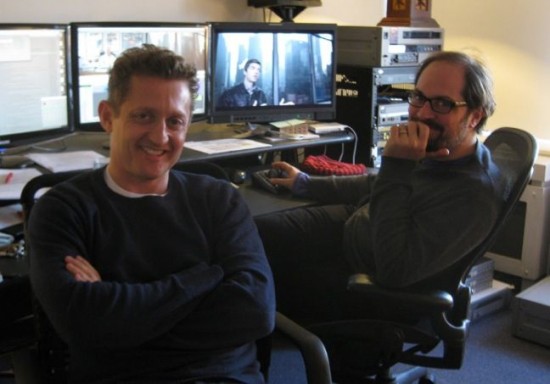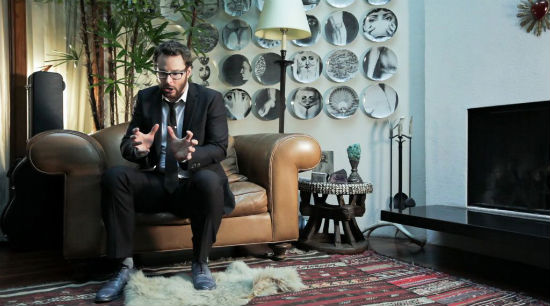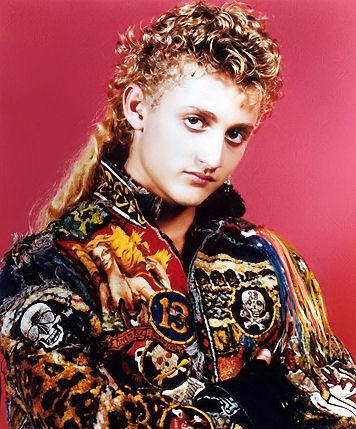/Film Interview: Alex Winter Discusses SXSW Napster Doc 'Downloaded'
Think about Facebook, iPods, iTunes — all things you might use every single day. They all have seeds in the "little program that could," called Napster. Co-created by Shawn Fanning and Sean Parker in the late 1990s, the file-sharing service/social network was not only ahead of its time technologically and socially, it completely changed how the public consumes media. If it wasn't for Fanning and Parker, who knows how long it would have taken for corporations to allow you to download music on your computer or rent one of their movies without leaving your house.
All this is at the center of Downloaded, a brand-new documentary by Alex Winter. Winter (seen above with Fanning and Parker) is best known as an actor (Lost Boys, Bill and Ted) but has been directing for some time. With Downloaded, he tackles a massive topic with authority and energy, telling the story of Napster from its earliest moments through its culture peak and long term fallout. It world premieres this week at South by Southwest in Austin and will be released by VH1 Rock Docs. After that, you'll be able to see it on demand and online.
We spoke to Winter about Downloaded and found out it was a project he'd been developing for long time before it evolved into its current state. He talked about trying to focus such a huge topic, culling together a huge wealth of media and, of course, The Lost Boys and Bill and Ted 3. Read the interview below.
/Film: So when I think "Alex Winter," I think of Bill and Ted, or Lost Boys. I'm not thinking about Napster. How did you become a part of this project?
Alex Winter: Well you know, I have always been into technology and music. I was sort of big into the internet from the beginning just as a laymen. I got on to the BBS networks and the news groups and the kind of beginnings of internet community once it had gotten out of hackers hands and into regular Joe's hands in the early nineties, or to some degree in the late eighties and so when Napster hit in 98 or 99 I was completely blown away by it, specifically from the musical internet community standpoint. It was just such a radical leap forward from anything I had ever seen before on almost every conceivable level and then the whole music side of it and being exposed to so much music and being re-exposed to music that I had kind of lost touch with, finding other people online.
So I just thought it was extraordinary and once the dust settled and we realized what a legal minefield this was, I kind of started following the story and discovered just from really being a newsreader how captivating Fanning was and Parker was and so I approached Fanning in 2002 to make a movie out of the story, which I just thought was an incredible story. I pitched it to a studio and wrote it for a major studio to direct it and I took a couple of years of research and all of that and like a lot of studio movies, it never got made. I just took off on to other stuff for a while and then a few years ago I got really disheartened by how little movement there had been since the early 2000's in terms of different sides coming together, old paradigms, new paradigms, artists, public. There was just so much contention and so much divisiveness, so I thought at that point "Why not make it a documentary?" I really knew everybody involved, since I did so much work on it as a narrative. I knew all of the Napster guys, all of the record label guys, all the tech gurus, and the legal or ethical mavericks who were dealing with copyright and internet rights, so I figured "Why not just make a movie that lets all of these guys talk and I'll get the hell out of the way?"
So you sort of wrote The Social Network before The Social Network was The Social Network.
Well I'm sure the... The digital revolution is one of the biggest things that has happened, certainly in my lifetime and I've been around a while. So I'm sure there's a lot of stories about the digital revolution out there and frankly I think we are going to see a lot of them. There are a lot of stories to be told and there's a lot of... Look at the tragedy that just happened with Aaron Schwartz last month. I mean it's absolutely unfolding as we speak, so it's just the world that we are sitting in at the moment.
So how did you hook up with VH1 on the film and what's the release plan?
Well it isn't a TV movie. It's a movie movie. It will come out on VH1 after a theatrical run. The division that I pitched it to is called Rock Docs and those guys are great and they made ANVIL and THE PEOPLE VERSUS JOHN LENNON. They made a bunch of theatrical documentaries that have done really well... MARLEY... So for me it was just about making it a theatrical documentary as opposed to a theatrical narrative and it was great to be working with those guys, because they get music and they get technology and they have a very deep and rich archive of media on Napster, because they are connected to MTV who covered the hell out of this story. So it was great to work with them, but in terms of the roll out, it will be like any theatrical doc. It will be this festival run and it will have this theatrical/digital window, then TV will be last.
 That was one of the things I notice watching this movie. I just keep getting blown away by all of the footage that you guys had of Napster, like what it looked like on a computer in 1998 and South Park and The Daily Show, then realize "Oh, it's all Viacom. It's all connected to VH1." Did that make it easier to get all of that footage?
That was one of the things I notice watching this movie. I just keep getting blown away by all of the footage that you guys had of Napster, like what it looked like on a computer in 1998 and South Park and The Daily Show, then realize "Oh, it's all Viacom. It's all connected to VH1." Did that make it easier to get all of that footage?
Absolutely it does. I mean you still have to clear the rights and it wasn't all of the... As you know from having seen it, there's a ton of archival in the movie and it's not all from Viacom related sources, it's from all over, like ABC and everywhere basically, but you know the upside was that having written the narrative and I wrote it for MTV Films originally, so it was always kind of in the Viacom family, so that was my first port of call when I decided to make it a doc was just to stay within the Viacom family. I had written it for Paramount and for MTV and so I decided when doing a doc to go to the doc people there.
Was there any kind of footage that you couldn't clear? Any kind of iconic Napster thing that wasn't' there? I didn't think of anything, but maybe you did.
I don't think so. I mean there were things I decided not to use just because I felt they were either over exposed or just would diverge from the point, but it was definitely... The process of making this movie was definitely a process of removal where we just had so much material and for me and Jacob, the editor, it was really about refining all of this. I mean that was really my reason for making the movie, I felt like there was such a mess of information out there about how we got here, like "Where did this stuff start? How did we get here? Where are we going?" It felt like it had never been... No one had ever made an attempt to go up into the attic and try to clear up all of this crap and give it some context. So that was really my motivation, so at least my experience with the story through the Napster lens is just try to give it as much context as possible and hopefully give a clear representation of a story I think has been really misrepresented over the years.
A couple of times you could tell the documentary edging into much bigger subjects. It briefly mentions Facebook, and a little about Steve Jobs, all of these things that Napster is related to. It is the beginning of this whole thing that we are with now. So how did you manage to keep it so focused when you could just keep going?
(Laughs) Yeah, I mean that was really a question, like "Do we make a mini-series?" For me it was really about saying... and this is why I love documentaries, it's like "This is really primarily going to be about the rise and fall of Napster. This is primarily going to be about an eighteen year old kid from the wrong end of Boston that invented and coded what would become the basis for all peer to peer file share and what that was like." So for me, as a narrative focus, I always wanted to come back to that and the thing that helped us I would say weave in some of the bigger stories without it becoming too tangential was that it's not as if Shawn and John bailed out of this industry. They've remained very immersed in this industry, so they kind of remained a thread even once we get into the back end stuff of the movie. They remain a thread through all of that stuff, especially once you get to Spotify and what they both did, Shawn's attempt with Snow Cap Fannings to rectify past... So the movie really is not the definitive story of the digital revolution, it's honestly the story of two kids and a company that came and went and what the ramifications of that were.
 After The Social Network Sean Parker became even more of a cult figure than he was, and you talked to him several times throughout the movie. In this one location I couldn't stop questioning, he's in this really weird apartment with a bear skin rug and all of this stuff... is that his place? (seen above)
After The Social Network Sean Parker became even more of a cult figure than he was, and you talked to him several times throughout the movie. In this one location I couldn't stop questioning, he's in this really weird apartment with a bear skin rug and all of this stuff... is that his place? (seen above)
(Laughs) It's not an apartment, that's his townhouse in the West Village. It's a big giant West Village house that he lives in.
I was just curious. Also, while you do a great job with keeping the film balanced as the Napster story, they weren't totally in the right, so you have Metallica and Dr. Dre and record industry input. One thing that I did feel was missing was how those guys feel now. You talked to some record company guys now, but not the artists. Was that something you attempted to do?
Well Lars does talk about it. I do have Lars talking about it now and that interview is in the movie. He's on that metal show and he has this long speech about what he felt had come and gone and then the present day interviews really to me served that purpose, talking to Henry [Rollins], talking Mike D, talking to Noel Gallagher to have perspective, but you know the reality of it is that what was most important to me wasn't to make a movie about reconciliation, because that to me is like if you read any trash... What I really didn't want was a kind of a music news movie, because it's... I was really trying to make a focus narrative and that's just everywhere. I mean it you dumped this entire catalog on Spotify that stuff is so readily available I felt like it was kind of pointless for lack of a better way of putting it.
It's just that's kind of the news of the world that we are in, we know that artists are embracing digital all over the place, because they are all releasing their albums that way now. So I tried to focus on any sort of present day perspective that I thought was rare or interesting take on where we are at, which I thought was provided really well by Noel Gallagher and Henry of "What's our way forward" I think it was represented really well by Larry Lassek where he just asks the question of "Is the artist going to be as screwed in the future as they were in the past?"
 Absolutely. Last two things, non-Napster... The Lost Boys is one of my favorite movies of all time. What are your fondest memories of it looking back and do you think the direct to DVD sequels affected the legacy at all?
Absolutely. Last two things, non-Napster... The Lost Boys is one of my favorite movies of all time. What are your fondest memories of it looking back and do you think the direct to DVD sequels affected the legacy at all?
Well I haven't seen the DVD sequels, so I honestly don't know, though I tend to now feel that legacy's get hurt by... I don't like bad remakes and I'm not calling those bad remakes since I haven't seen them, but... I don't really mind them, because I don't really feel like... You know, TEXAS CHAINSAW will always be TEXAS CHAINSAW, I can't see how that's possibly been damaged by the remake. You just don't go see them if they are crappy, you know? But I still love TEXAS CHAINSAW. So I don't know about the legacy, though you know I wouldn't be so arrogant as to try to inflate the legacy of LOST BOYS personally, but there are so many stories...
I rented it again recently and it's without a doubt, since I've been in this business since I was ten, the most fun I ever had on a job in my life. It was sick. It was just... It was like every actor is a wannabe rock and roll star, right? It was like we were a rock band, like the four of us worked nights in Santa Cruz and road motorcycles. It was crazy and it was enormous amounts of fun. Joel runs a really great set. I made a lot of friends on that show and I was a kid fresh out of film school and it was kind of like stepping into Oz in terms of stepping out of my crappy ramen filled New York world into this giant Hollywood movie. (Laughs) It really was... I wouldn't know where to start. I mean every night was insanity and it went on for months and months, but it was a really good time.
Awesome and then the last one, the one I'm sure you've answered a million times, is the BILL AND TED 3 thing. I'm going to try to spin it a little bit. We know that there's a director attached and you guys are both interested and there are people working on the screenplay. At this point, what's the hold up? Do you think it's actually going to happen?
Well the funny thing is there really isn't a hold up. Nothing held it up other than it got leaked really early in the process, so these things take a shitload of time to get bobbed around and we are really just in the process. It's really mundane to report the day-to-day process of trying to get a movie made, so right now "they're doing a rewrite?" You know? That's my news, "they are doing a rewrite." That will take a while and then we will look at it and that might need another rewrite and that will be my next bit of news. So it's just like... The short answer is it got leaked way too early. It got leaked just as we started, me and Keanu and Chris and Ed, the two writers just started to put it together. Then you've got the whole genesis of putting it together in front of you still, which is where we are at now.
And we were just talking about media and Napster as sort of the whole reporting of films has sort of changed.
Well completely. I mean absolutely. There's such a constant... The flow of information... The comprehension of how things work has not caught up with the flow of information. Do you know what I mean? So that often leads to confusion, because people are just like "Well I read about this four years ago" and I'm like "Well yeah, but it takes four to six years to get most of this stuff made." It's just where we are at, and look I don't have any problem with the fact that it got leaked, because it's nice that people are interested in talking about it. It's not like you could complain that people are interested and we all feel kind of jazzed that people give a crap frankly. We're just off trying to make sure that if we do it, it's good.
For more information on Downloaded at SXSW, click here.
Photos: Vh1 Rock Docs
